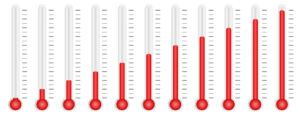There’s a Hot Number! Your Air Conditioner’s SEER Score, Explained
Reduce Your Energy Bills Without Sacrificing Indoor Comfort

When it comes to buying a new air conditioner, you want a unit that saves money on energy costs. And one that keeps your home or office cool and comfortable throughout the hot months. It’s also nice to know your new HVAC system is environmentally responsible, too. So, which air conditioner should you choose? And what does that SEER score mean?
Many variables will come into play in making this decision, but one consideration will be the SEER score of your new unit. In fact, if you’re talking to a salesperson, this may be the number they use to sell you the most advanced unit available. Don’t make this mistake. Before you buy, take the time to learn what the SEER score is, why it matters, and most importantly, why it should NOT be the single number that determines your air conditioner purchase.
What is a SEER Score?
SEER stands for Seasonal Energy Efficiency Ratio. It’s a benchmark for the amount of electricity a unit uses in delivering units of cooling (measurements called Btu/hs). By law, new air conditioning systems as of 2017 must have a SEER score between 13 and 25. In theory, higher scores reflect a more favorable ratio of cooling output to the energy consumed.
So, should you buy an air conditioner with the highest SEER score possible? You may think so, but that’s simply not the case.
The SEER score is NOT a fixed number that guarantees your system will operate at that ratio throughout the summer months. By the very nature of how it’s calculated, the SEER score reflects only an average. And that’s assuming a constant indoor temperature and varying outdoor conditions. Therefore, if your air conditioner rates 25, that doesn’t mean it will operate throughout the season at that level.
For example, if you simply adjust the thermostat daily or multiple times a day, your system will not always operate at a high SEER ratio. Factors like changing weather, the overall quality of your equipment, and even whether your home is built on a basement or a slab will matter when it comes to determining the right SEER rating you should choose for your HVAC system.
High SEER Scores Can Mean More Expensive HVAC
Other factors that affect your buying decision should include cost. High SEER rated products are more expensive to install and maintain than lower-rated ones. Also, it’s important to consider that you’ll find most older air conditioning units already installed in homes and offices throughout the Southland are probably SEER rated 8-10. Even purchasing an air conditioner unit rated 13 or 14 will represent a huge improvement to your energy efficiency and costs.
The bottom line? Don’t fall for a sales pitch. Talk to an HVAC expert. Get the information first before you purchase. It should go without saying, but a good salesperson won’t make you feel pressured or force you to buy now to save later. “One size fits all” or “One SEER fits all” is never the right way to go about purchasing a new HVAC system.
Save Money with a SEER Score-Approved Air Conditioner from Air-Tro
Have questions about the SEER score or need some advice? Call Air-Tro at 626-357-3535 today to discuss the air conditioner options that are right for your home or office. Your indoor comfort is our priority!
